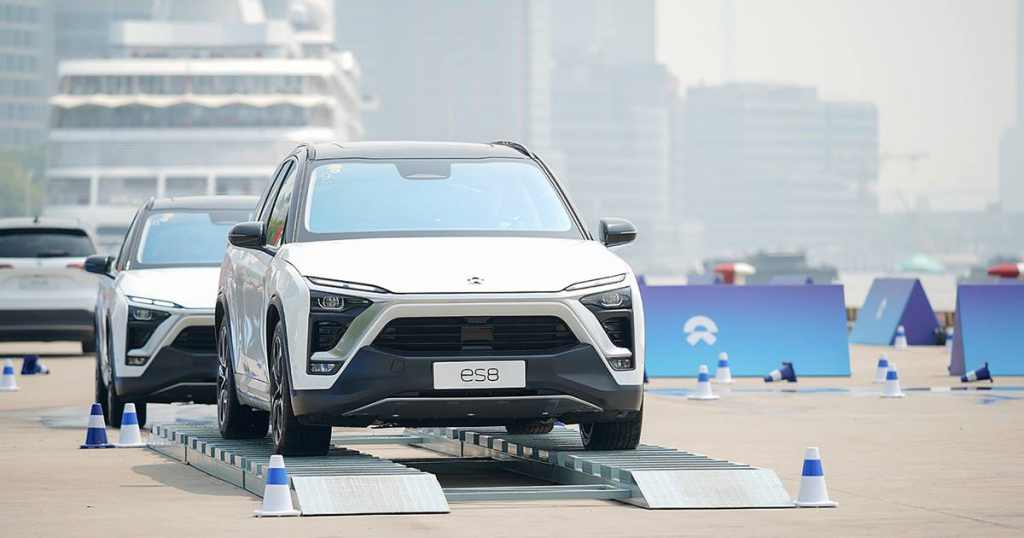Read The Full Article On: Investors
Chinese EV stocks fell Tuesday despite Nio (NIO) and Xpeng (XPEV) reporting a jump in November sales, and Goldman Sachs hiking its price targets on Nio stock and Li Auto (LI).
he sales gains and the upbeat outlook from Goldman come as demand for electric vehicles in China rebounds this year.
Nio said it delivered 5,291 vehicles last month, a 109% jump. The company said it was “in the process” of speeding up production capacity expansion this month to handle the increase in orders.
Xpeng delivered 4,224 smart electric vehicles in November, a 342% increase. The company’s smart sports sedan, the P7, led the gains. The P7 competes against the made-in-China Tesla Model 3.
Monthly figures from Li Auto and BYD (BYDDF) are expected later this week as well.
Meanwhile, Goldman Sachs raised its price target on Li Auto to 60 from 20.60 and on Nio to 59 from 7.70. They also upgraded Nio stock to neutral, from sell.
Goldman predicted that electric vehicle penetration in China would reach 20% by 2025, up from 5% this year. It sees that penetration reaching 53% in 2035 and 80% in 2050.
EV Stocks Fall
Li Auto stock reversed lower to drop 1.7% in the stock market today. Nio stock fell 7%. Both stocks have strong ratings from IBD. Nio’s Composite Rating is 96. Li Auto’s is 95. The 50-day lines for both stocks have swept higher this year.
Xpeng stock sank 7.5%. XPEV has an 87 Composite Rating.
Kandi Technologies (KNDI) slid 10%, continuing its plunge after short-seller Hindenburg Research accused the company of fabricating sales.
Among other EV stocks, Tesla (TSLA) added 2.8%. TSLA stock will join the S&P 500 index in one big step before Dec. 21, S&P Dow Jones Indices announced late Monday. On Monday, China gave Tesla the OK to sell its Model Y SUVs in the nation.
Tesla recently expanded manufacturing capacity it its Shanghai Giga factory to begin producing the Model Y. The U.S. electric-vehicle maker also sells its Model 3 cars in China.
Goldman’s Takes On Li Auto, Nio Stock
Goldman’s EV stocks analysts said they believed Li Auto was “differentiating itself from the broader Chinese auto-making industry by envisioning and creating compelling EV consumer experiences — and showing a willingness to take on the risk of unconventional technologies and act innovatively.”
They added that the company’s Li One vehicle, launched last year, was the bestselling electric SUV in China. The analysts said they expected Li Auto to use the Li One as a platform for offering autonomous driving, among other things, that would help drive longer-term adoption.
Goldman also said the Li One had the largest interior space of any top-selling electric vehicle in China, and a longer driving range.
For Nio, the EV stocks analysts said their downgrade to sell, in July, was based on a belief that “the share price at the time reflected over-optimism given no substantial changes to volume/profit expectations.”
“In hindsight,” the analysts continued, “we underestimated the benefits to Nio from: (1) powertrain breakthroughs, particularly with the cell-to-pack/blade large cell technologies; (2) the introduction of Nio’s battery as a service (BaaS) program, which has significantly expanded Nio’s addressable market; and (3) regulatory incentives that turned around EV market demand from an ongoing decline.”
Nio’s battery as a service program, launched in August, allows drivers to buy a car without a battery, but subscribe to different battery packs, based on their needs, on a monthly basis.

